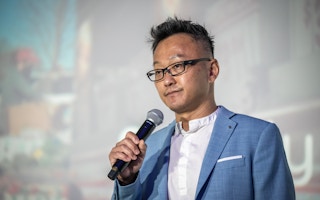Global supply chain disruptions brought about by the Covid-19 pandemic have exposed a lack of investment in food technology that could have eased the food security issues that have affected many parts of the world this year, a sustainability entrepreneur said on Wednesday (8 June).
To continue reading, subscribe to Eco‑Business.
There's something for everyone. We offer a range of subscription plans.
- Access our stories and receive our Insights Weekly newsletter with the free EB Member plan.
- Unlock unlimited access to our content and archive with EB Circle.
- Publish your content with EB Premium.
Speaking at the grand finale of sustainability solution competition The Liveability Challenge, former winner Eugene Wang, the founder of a firm that makes meat substitutes from microalgae, said that the investment community has been too preoccupied with communications and internet technology, and insufficiently focussed on tech that can improve agriculture and food production, supply and distribution.
The ongoing coronavirus pandemic, which so far has claimed more than 500,000 lives, has upended global food supply chains. It has drained food banks and restricted the planting and harvesting of crops as well as food distribution, prompting calls for a more localised approach to food production.
“This pandemic is teaching us that we human beings have invested too much money and brainpower in internet, communications, semiconductors, and even pharmaceuticals,” Wang told a business and consumer audience watching on Zoom and Facebook.
“
Some people say sustainability is a marketing gimmick, or a slogan for politicians to get voted in. For me, it’s a kind of freedom.
Eugene Wang, founder, Sophie’s BioNutrients
“During the lockdown, you can sit comfortably working or talking to your friends or your relatives [using internet communications technology], while a vaccine will be developed within a year. But looking at the food supply globally, we’ve had so many problems,” he noted.
“Why? Because I think we’ve underinvested in food and agriculture technology. It’s time to re-evaluate our approach to food and agriculture technology. We need more money and brainpower in this field.”
Venture capital investing in food and agriculture technology dropped by 5 per cent last year, to US$19.8 billion, from a record high of US$20.8 billion in 2018. By comparison, more than US$4 trillion was spent on information technology in 2019.
Wang’s company, Sophie’s BioNutrients, the Singapore-based sister firm of California-headquartered Sophie’s Kitchen, won S$1 million in funding from sustainability innovation competition The Liveability Challenge last year. After winning the competition, Wang set up Sophie’s BioNutrients in Singapore.
Wang said he planned to expand his company’s product portfolio beyond plant-based seafood into a “total food production system”, using lipids from the microalgae to make cooking oil, the starch to make noodles and baking goods, and the raw biomass to produce animal feed.
With greater investment in foodtech, more food could be produced locally, so the dependence of countries like Singapore on food imports could be curtailed, he said. The tightening of the border between Singapore and Malaysia earlier this year prompted panic buying in Singapore, as consumers worried about food shortages.
The Singapore government announced last year that by 2030, the country could produce 30 per cent of its own food, up from less than 10 per cent now. But Wang said that with foodtech and vertical farming, “we should be able to solve 50 per cent of Singapore’s food supply needs” by 2030.
Wang, whose company was founded in 2010, around the time companies such as Impossible Foods and Beyond Meat started to push bio-engineered and plant-based meat substitutes into the mainstream, said that more localised food production using technology would ensure greater food security.
“Some people say sustainability is a solution to our current problems, some say it’s a path to the future. Some say it’s a marketing gimmick, or a slogan for politicians to get voted in,” he said. “For me, it’s a kind of freedom. If you can achieve total sustainability, you’re free from fear, free from limitation, free from any kind of boundary.”
This year’s Liveability Challenge was won by TurtleTree Labs, a Singapore-based biotechnology firm that produces lab-grown milk. Land-scarce Singapore has three dairy farms, but imports most of its milk from overseas.














